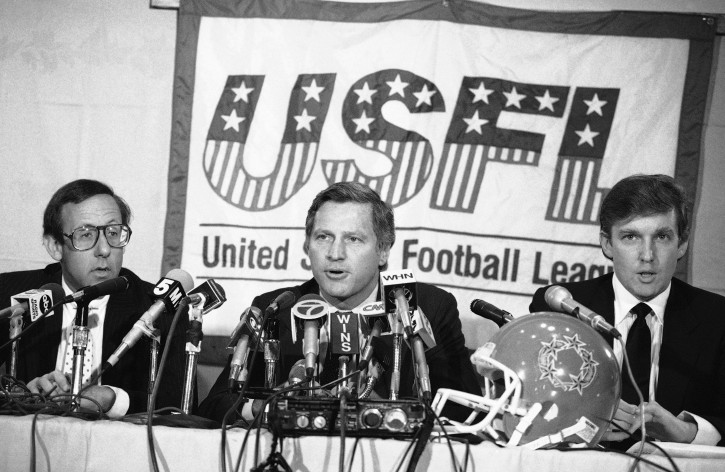
Washington – Donald Trump’s flirtation with professional football lasted for three decades. He never ended up with an NFL franchise despite repeated demonstrations of interest.
That’s probably for the best, he says.
Had his 2014 bid for the Buffalo Bills had worked out, he probably wouldn’t be running for president now.
“If I bought that team, I wouldn’t be doing what I’m doing,” he said in an interview with The Associated Press.
It’s been 30 years since the demise of the United States Football League, an upstart group that Trump led in a high-profile but ultimately unsuccessful legal battle against the NFL. Along the way, Trump signed high-profile players such as quarterback Doug Flutie and others, basked in national publicity and antagonized the NFL every chance he got.
He challenged the Jets to a $1 million exhibition match. He briefly signed Lawrence Taylor away from the New York Giants — forcing the Giants to pay to get the star back. He led fellow USFL owners to challenge the NFL as a monopoly in court, a maneuver intended to force a merger of the two leagues.
Though the USFL won only a token $1 jury verdict, the NFL got stuck paying tens of millions of dollars to cover both sides’ legal fees.
“I have a warm spot in my heart for that period,” Trump said. “I had a great time.”
The NFL’s owners at the time might not have had so much fun, Trump acknowledges, and the specter of the USFL has loomed over his repeated flirtations with NFL ownership.
Trump surfaced nonetheless as a possible buyer of the New England Patriots in 1988, just two years after the USFL case. (The Boston Globe reported he dropped out over unwillingness to cover the Patriots’ $104 million in debt at the time.)
More recently, Trump was a contender for the Buffalo Bills. He says he submitted a billion-dollar offer for the team in 2014, though other accounts of the sale process pegged his offer below that.
“I did it a little tentatively,” Trump says of his offer. “When I put the bid in for the Buffalo Bills, I always was a little concerned if the NFL would remember how I knocked the hell out of them.”
Had Trump won the bid, he would have needed the approval of a two-thirds majority of the NFL’s owners. Though he expressed confidence at the time that NFL owners wouldn’t hold a grudge, “I think they might have,” Trump says now. “I would not have wanted to get a modern-day rejection.”
Trump never faced that test; he was outbid. That was for the best, he now says.
“This is more exciting,” he said of his presidential campaign. “And it’s a lot cheaper.”
As reported by Vos Iz Neias
